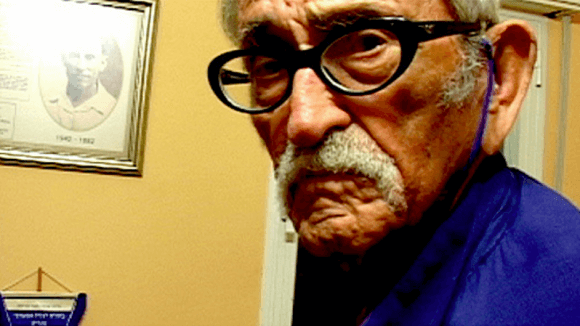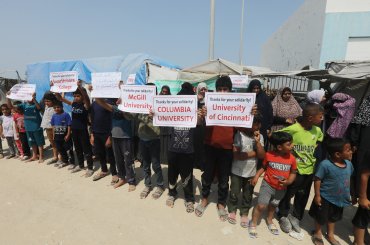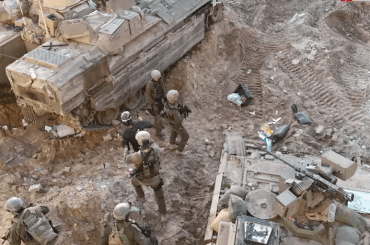On Saturday, January 30, 2016 a frail old man with a handlebar moustache, piercing eyes and a constant smile passed away at the ripe old age of 101 in a kibbutz he had helped found in north Israel. Had I been at home I probably would have attended his funeral out of respect for the man. Dov Yermiya was an acquaintance of mine for many years. After a successful soldiering career in the Hagana forces that established the state of Israel to become its official army, he turned peace activist, met with PLO representatives when that was still illegal in Israel and, in 2009, renounced Zionism altogether in protest against its premeditated slaughter in Gaza.
One thing on which Dov and I never saw eye to eye was 1948. He fully accepted what happened and sought to smooth things over with neighborly gestures of kindness to those like me who survived the Nakba and stayed on the Israeli side of the boarder. To his credit, Dov saw the injustice of the military rule that Israel imposed on us, its Arab citizens, for the first two decades of our new citizenship. He refused to accept the post of Military Governor of Nazareth, the one major Palestinian city that miraculously escaped active cleansing in 1948. Dov had participated in the city’s takeover by the Hagana. He went on to agitate for the ending of the draconian system originally promulgated by the British Mandate Government to handle Jewish troublesome gangs in Palestine headed by the likes of Menahim Begin and Yitzhak Shamir.
Another famous feat of Dov’s soldiering career: In the 1982 war on Lebanon, which actually was a war against the Palestinian refugees that he had expelled from their homes in Galilee to the other side of Israel’s northern border, Dov volunteered to serve in the invading forces as the officer in charge of foreign civilians. I recall our mutual friends, the Petrokowskis, rooting for him and supporting his goodwill campaign with donations of food and clothing items for the Lebanese first timers and the Palestinian repeat refugees in South Lebanon. I remember him later reporting how outraged he was by the practice of Israeli commanders who discriminated between their expelled victims, making Moslems stand in the sun for hours while letting Christians stand in the shade. That and similar indecencies that didn’t fit well with his military honor code led him to write his famous book, My War Diary: Israel in Lebanon, (Pluto Press, 1984) which led to his dismissal from his military post. Here he turned to full peace activism. Our attempts at bonding were galvanized based on this change of heart and my chronic pacifism.
Here is a paragraph from my book of memoirs, A Doctor in Galilee (Pluto Press, 2008) that illustrates the operational style and extent of exceptionalism of Israeli liberal Zionists like Dov:
It is worth briefly mentioning the peculiar circumstances in which I first got to know the Petrokowski family [mutual friends of Dov and mine.] It was through Said Nassar, a friend in Arrabeh [my home village] who landed himself a job at the Naharya Hospital laboratory. However, his employment was terminated when a jealous relative and well-known Shin Bet collaborator identified Said as a security threat. After his dismissal, Said sought help from the newly formed Jewish-Arab Coexistence Circle in Naharya, to which some influential Jews belonged, including Dov [Yermiyah,] the pre-1948 commander of the Haganah forces that conquered most of Western Galilee, and his wife, [Menuha,] who grew up on Kibbutz Nahlal surrounded by such legendary figures as General Moshe Dayan. [Said was reinstated in his job thanks to the group’s efforts.]
Menuha, Dov’s third wife, was a nurse. She worked in the Western Galilee Public Health Office that I headed for two decades before Ehud Olmert, then the Minister of Health, forced me out of my position. On occasion, while serving in the same office, Menuha and I exchanged family visits. But Dov’s and my paths crossed in yet another way. I had founded and headed the Galilee Society for Health Research and Services, an NGO dedicated to bringing better health to Palestinian communities in Israel. We ran a mobile clinic that brought medical services to unrecognized Bedouin villages in direct opposition to the will of the government. The World Council of Churches had started kindergartens in two such Galilee mountaintop villages, Kammaneh and Hussainiyeh. These were border skirmishes, so to speak, in the ongoing battle that the State of Israel waged in its attempt to dislodge the Bedouins of the Galilee from their ancestral lands. It used, among other means, withholding of essential services including schools, clinics, water supply, electricity and other infrastructure and public facilities. Our efforts were aimed in the opposite direction to help the communities survive and withstand the intentional deprivation. Practically, we barricaded ourselves with the locals. Once a week Dov, Don Quixote-like, hitchhiked up the mountain to enter the same trenches the tribesmen occupied. He came to play his accordion for the kindergarten children. That was where we met regularly. This time Dov was on the right side of history; the two communities survived.
On occasion in retirement, Said, the hospital laboratory man that had introduced us to start with, and I visited Dov and Menuha in their home in Naharya. Their Palestinian housekeeper was always very attentive to all the guest-receiving formalities, what with coffee, soft drinks, fresh fruits etc. She was an internally displaced refugee, a “present absentee,” whose family was driven out of their coastal village in 1948 at the hands of no other commander but Dov Yermiya. He now was full of praise for her dedication and of thanks to the Department of Social Welfare that paid her minimal wages. She, for her turn, thankfully acknowledged Master Yermiya’s kindness and mentioned his and his wife’s frequent gestures of goodwill in insisting that she take home the occasional extra clothing item and whatever excess food and supplies remained each day.
Here is one last account of what seems to have paved the road for Dov’s renunciation of Zionism quite late in the game. It is from a review that I wrote of Adina Hoffman’s biography of the Palestinian internally displaced poet Taha Muhammad Ali, http://a-doctor-in-galilee.blogspot.com/2009/09/another-man-from-nazareth.html
Hoffman’s recounting and acceptance of Taha’s remembered version of events and her insistence on aligning such accounts with recorded documents is far from an easy task given the highly oral Palestinian narrative and the most incessant documentarian yet no less skewed Israeli parallel narrative. Taha’s account of the events of Saffuriyya’s Nakba, for example, supported by other Saffuriyyan who lived through the horrific events brings her up against the contrary version accepted in the Israeli narrative. The contradiction is finally, and for the first time ever, resolved in favor of Taha’s truth by Hoffman delving in the Israeli military archives and discovering the previously unknown records of the air raid that actually did take place despite the denial of no less a trusted source than Dov [Yermiya,] the Hagana commander who entered the abandoned village and who has since converted to pacifism and renounced Zionism altogether. He himself had never known of the air attack.
Dov always spoke proudly of his heroic achievements in “the War of Liberation” and how he and his troops were “the most moral army in the world”. He maintained the delusion that they were so feared, that the defenders of villages like Saffuriyya cut and ran without firing a shot to defend themselves. I recall talking to him about the discovery that even he was kept in the dark regarding the air raids that were carried out ahead of his troop’s advances. He was extremely disappointed by Ben-Gurion and his top commanders keeping him in the dark at the time and all those years afterward.
Could that discovery have tipped the scale in Dov’s moral quandary regarding his allegiance to Zionism? And, since I have started this guessing game, let me throw in another speculation: Could the man have held a deep grudge against the entire Zionist command in Israel because of the war he had lost to the more decorated general of the Israeli forces, the Chief of Staff at the time, Moshe Dayan? At the height of their military careers Dayan captured the heart of Dov’s young second wife leading to their divorce and to acrimonious exchanges that reached to Ben-Gurion himself. The Prime Minister tried to avoid entering the fray between his two soldiers by talking of abstract philosophical issues of the difference between public and private persona. But obviously he ended up siding with his Chief of Staff, Dayan, by not honoring Yermiya’s request to dismiss him from office. Ben-Gurion had a way of trivializing issues he didn’t want to be caught addressing with a dismissive wave of his hand. That, for example, was the way he notoriously signaled his answer to Yitzhak Rabin to get rid of the Palestinian population of Lydda and Ramla. Did Dov Yermiya interpret the big boss’s refusal to get involved as ignoring him? Did that leave a dark spot in his heart that eventually added to the cumulative deposit of pain and revulsion that got him to his rejection of Zionism and its current military leaders in 2009? I even wonder if Dov ever considered an armed revolt against such commanders. I suspect that it must have crossed his mind. And that he must have decided on the no-less-treasonous step in Israel of committing to peace, albeit at a late date.
Like other Israeli liberal Zionists, including Uri Avnery for example, Dov had drawn a line under 1948: “It was a war and we won it, period!!” On a few occasions I heard him speak of that era in tones that betrayed his willful insistence not to doubt history as he had always known it. That blind spot put a damper on our enthusiasm for each other. He died with our relationship still simmering on the edge of full friendship after near half a century of trying but never getting quite there.
Dov was a valued acquaintance. May his soul rest in peace.



Thanks for sharing this, Hatim.
It’s so powerfully written and told and with real nuggets of truth and wisdom, as usual.